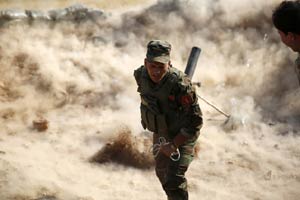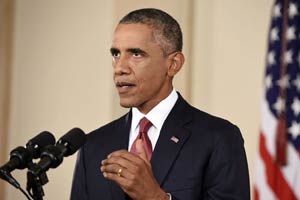US, Arab partners launch first strikes on IS in Syria
(Agencies) Updated: 2014-09-23 10:08WASHINGTON - The United States and several Gulf Arab allies launched air and missile strikes on Islamic State strongholds in Syria on Tuesday, US officials said, opening a new, far more complicated front in the battle against the militants.
"I can confirm that US military and partner nation forces are undertaking military action against (Islamic State) terrorists in Syria using a mix of fighter, bomber and Tomahawk Land Attack Missiles," Rear Admiral John Kirby, Pentagon press secretary, said in a statement.
"Given that these operations are ongoing, we are not in a position to provide additional details at this time."
A US official, speaking on condition of anonymity, said that Saudi Arabia, the United Arab Emirates, Jordan and Bahrain were all involved, although their exact roles in the military action were unclear. Qatar played a supporting role in the air strikes, the official said.
Another official said at least one US ship had launched surface-to-surface Tomahawk cruise missiles. Armed US drones were also used in the attacks.
The targets included Raqqa city, the headquarters of Islamic State, an extremist Sunni Muslim force that has seized large expanses of territory in Iraq and Syria and proclaimed a caliphate erasing borders in the heart of the Middle East.
Syrian state television said the United States informed Syria's U.N. representative on Monday that Islamic State targets would be hit in Raqqa, which is 400 km (250 miles) northeast of Damascus.
US officials and the Syrian Observatory for Human Rights, a monitoring group that tracks violence in the Syrian war, said buildings used by the militants, their weapons supplies and checkpoints were targeted in the attacks on Raqqa. Areas along the Iraq-Syria border were also hit.
"There are tens of wounded and dead," Rami Abdulrahman, head of the Observatory, which gathers information from a network of activists on the ground, told Reuters by phone.
The addition of Arab allies was seen as crucial for the credibility of the American-led campaign. US allies in the Middle East are skeptical of how far Washington will commit to a conflict in which nearly every country in the region has a stake, set against the backdrop of Islam's 1,300-year-old rift between Sunnis and Shi'ites.
As part of US efforts to build the coalition, Secretary of State John Kerry traveled to New York at the weekend, ahead of the start of United Nations General Assembly meetings, for talks with counterparts from Arab and European allies to discuss plans to defeat Islamic State and hear their views on how they might participate.
 |
 |
| US expands campaign against IS | First US airstrikes in expanded Iraq fight |










